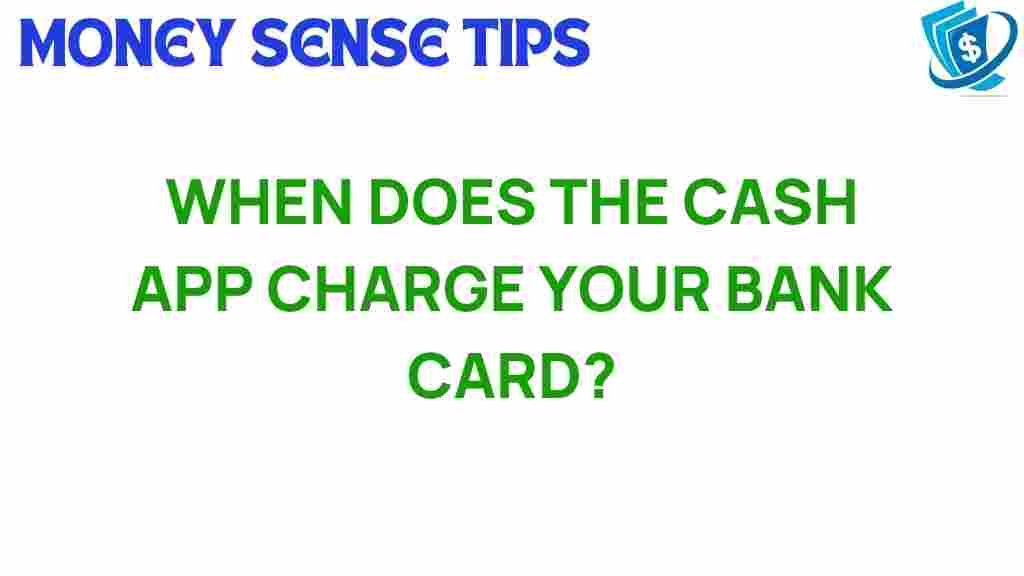Unraveling the Mystery: When Does Cash App Charge Your Bank Card?
In the rapidly evolving world of digital payments, Cash App stands out as a user-friendly financial app that enables seamless money transfers using a bank card. But many users are left wondering: when does Cash App charge your bank card? Understanding the timing of these transactions can significantly enhance your user experience and help you manage your finances more effectively. In this article, we will explore Cash App’s transaction timing, fees, and how it integrates into the broader landscape of digital payment solutions.
The Basics of Cash App and Bank Card Transactions
Cash App is a popular financial app that allows users to send and receive money, pay bills, and even invest in stocks and Bitcoin. It connects to your bank card or bank account, making it easy to transfer funds. However, the timing of when Cash App charges your bank card can be confusing. Here’s what you need to know:
How Cash App Works with Your Bank Card
When you use Cash App to make a payment, the app typically charges your linked bank card instantly. However, there are certain scenarios and transaction types that can affect when the charge appears on your bank statement.
- Instant Transfers: If you use Cash App to send money to a friend or pay for a service, the transaction is processed immediately, and your bank card is charged right away.
- Standard Transfers: When you transfer money from Cash App to your bank account, it may take 1-3 business days to reflect in your bank account, but your Cash App balance is adjusted immediately.
- Cash Card Transactions: Using the Cash Card for purchases will also reflect in your Cash App balance immediately, while the charge to your bank card will occur at the same time.
Understanding Fees Associated with Cash App
Cash App is known for its low fees, but it’s essential to understand when these fees apply. Here’s a breakdown:
- Standard Transactions: Sending money to friends or family using your Cash App balance or linked bank account is free.
- Credit Card Transactions: If you use a credit card to pay on Cash App, a 3% fee applies.
- Instant Transfer Fees: Cash App charges a fee for instant transfers to your bank account, typically around 1.5% of the amount transferred.
- ATM Withdrawal Fees: If you withdraw cash using your Cash Card, there may be ATM fees, but Cash App reimburses ATM fees for users who receive direct deposits of $300 or more monthly.
Transaction Timing: A Closer Look
To fully understand when Cash App charges your bank card, it’s crucial to look at the transaction process in detail. Below, we outline the transaction flow:
Step 1: Initiating a Transaction
When you initiate a transaction on Cash App, whether sending money, paying a bill, or using the Cash Card, the process begins immediately. Here’s what happens:
- Choose the recipient or service.
- Enter the amount you wish to send or pay.
- Select the payment method (Cash App balance, linked bank account, or bank card).
- Confirm the transaction details.
Step 2: Processing the Payment
Once you confirm the transaction:
- If using Cash App balance or bank account, the charge occurs immediately.
- If using a bank card, the transaction processes quickly, often within seconds.
Step 3: Charge Reflection on Your Bank Statement
The charge may not appear on your bank statement immediately. The timing can vary based on your bank’s processing times:
- Bank processing delays may cause a lag of a few hours to a day.
- Most banks will reflect the charge within 1-3 business days.
Troubleshooting Common Issues
Despite its straightforward interface, users may encounter issues regarding transaction timing and fees. Here are some common problems and how to resolve them:
Issue 1: Charge Not Appearing on Bank Statement
If you don’t see a charge on your bank statement, consider the following:
- Check if the transaction was completed in Cash App.
- Verify that you used the correct payment method.
- Wait for your bank to update its records; this may take a few hours to a day.
Issue 2: Unexpected Fees
If you notice a fee that you weren’t expecting:
- Confirm whether you used a credit card, which incurs a fee.
- Check if you opted for an instant transfer, which has associated fees.
- Review the transaction history in your Cash App for clarity.
Issue 3: Payment Failure
If a payment fails, you may receive an error message. Common reasons include:
- Insufficient funds in your bank account or Cash App balance.
- Issues with your linked bank card (expired or blocked).
- Technical glitches within Cash App.
In such cases, try re-linking your bank card or contacting Cash App support for assistance.
Enhancing Your Cash App Experience
To make the most of Cash App and enhance your user experience, consider the following tips:
- Link Multiple Payment Methods: Having multiple bank cards linked can offer flexibility in payments.
- Set Up Direct Deposit: This feature allows you to receive your paycheck directly into your Cash App account, facilitating easier transfers and fee reimbursements.
- Stay Informed on Fees: Regularly check for updates on Cash App fees to avoid surprises.
Conclusion
In conclusion, understanding when Cash App charges your bank card is crucial for managing your finances effectively. With instant payments, standard transfers, and the associated fees, users can navigate the app with greater confidence. By being aware of transaction timing, troubleshooting common issues, and enhancing your user experience, you can fully leverage the capabilities of Cash App in the evolving landscape of digital payments.
For more information on optimizing your use of financial apps, check out our comprehensive guide on digital payment solutions. If you have further questions about Cash App, visit their official support page for assistance.
This article is in the category Services and created by MoneySenseTips Team
